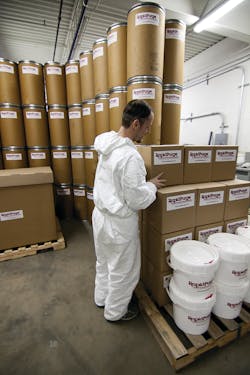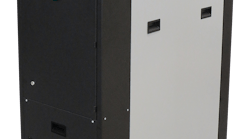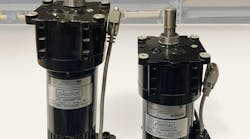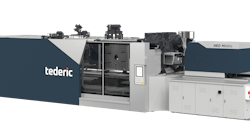Processors of thermoplastics can streamline their purging operations with new, multipurpose compounds that are applicable across multiple resins and processes, as well as wide temperature ranges.
RAPIDPURGE
RapidPurge, a purging compound supplier that will celebrate its 40th anniversary next year, is capping off its first four decades with some new products. Within the last year, it’s introduced two off-the-shelf mechanical purging compounds, MP6020 and MC900, that are designed to meet the needs of customers who had difficulty finding stock products that met all their requirements.
“They were both developed in response to our customers’ requests,” RapidPurge technical manager Barbara Giaquinto said. “RapidPurge regularly develops grades specifically for individual customers’ needs. In these two cases, the products were so effective that we made them stock items.”
Both are appropriate for cleaning injection molding machines, blow molding machines and extruders.
MP6020 offers the cleaning capabilities associated with glass-fiber-based purging compounds, but without the abrasion risk and other limitations normally associated with glass fiber.
The company developed the product, which comes in pellet form, for a customer that was experiencing heavy carbon contamination that created black specks in finished parts.
The customer does not use glass-fiber-filled products for fear of damaging metal surfaces or hot runners. RapidPurge’s solution was to “re- engineer” its flagship MP1000 grade.
The company created a purging compound strong enough to remove resins that also can be easily removed by the next production cycle.
“This balance is difficult to achieve,” Giaquinto said. “This grade is so effective that it very often negates the need to pull a screw and manually clean it after difficult applications.”
MP6020 also includes a heat-activated expanding agent that breaks loose resin that is hung up in low areas or has degraded and adhered to metal surfaces.
The purging agent is safe and effective for removing a variety of resins, from commodity to engineering grades. It can operate in a temperature range of 380 degrees Fahrenheit to 570 degrees Fahrenheit, and gives off no offensive fumes or odors, according to the company.
The second new product, MC900, is a concentrated pellet that can be run straight or blended with virgin resin.
This grade started as a concentrate for processors who wanted to mix it with virgin resin to save money or because they had difficulties finding a purging compound that was compatible with the resins they were running.
Processors have been able to get their costs below $2 per pound using MC900 as a concentrate mixed with lower-cost resins, according to the company.
Initially, RapidPurge thought MC900 would be too concentrated to run straight, but after a number of successful trials, the company determined that for difficult cleaning applications, the product could be run without diluting it with virgin resin.
This versatility in many cases eliminates the need for plastics processors to keep several purging compounds on hand, the company said.
MC900 is effective on a variety of resins, from commodity to engineering grades. It operates in a temperature range of 380 degrees Fahrenheit to 565 degrees Fahrenheit and, like MP6020, produces no offensive fumes or odors.
RapidPurge began developing purging compounds in 1979 and first sold the compounds in 1980. The company said RapidPurge was the first commercial purging compound introduced into the thermoplastic processing market. The company initially sold chemical purging compounds, but, in the years since, it has added mechanical purging compounds to its lineup.
While depolymerizing chemical purging compounds are still the go-to for the most difficult applications, mechanical purging compounds are more economical in some applications, such as easy color or material changes, the company said. Unlike chemical purging compounds, which require a soak time to activate the chemicals, mechanical purging compounds can run quickly through a machine.
CHEM-TREND
Processors that mold both acrylics and polycarbonates (PC) used in automotive lenses can simplify their purging process with a new compound that spans the processing temperatures of both types of resins.
Chem-Trend’s Ultra Purge C6090 purging compound is targeted at thermoplastics primarily used to manufacture automotive headlamp and rear-lamp lenses.
“For customers using one machine to manufacture both headlamp and rear-lamp lenses, this product allows for one complete purging agent,” Antje Scholl, Chem-Trend’s business development director for thermoplastics, said. “Ultra Purge C6090 can greatly improve the quality of final products and will contribute to overall waste reduction.”
In addition, being able to use a single purging compound minimizes quality issues and creates a consistent, simple and efficient process, the company said.
Ultra Purge C6090 provides a smooth transition between the processing temperature ranges of PC (536 degrees Fahrenheit to 608 degrees Fahrenheit) and acrylic (374 degrees Fahrenheit to 518 degrees Fahrenheit). It prevents PC from freezing at acrylic processing temperatures and acrylic from burning at PC processing temperatures, which can result in black specks.
Bruce Geiselman, senior staff reporter
Contact:
Chem-Trend LP,
Howell, Mich., 517-545-7980, www.chemtrend.com
RapidPurge,
Essex, Conn., 860-767-0085, www.rapidpurge.com






